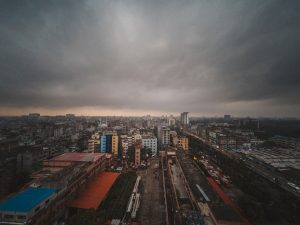Four years ago, my client was disappeared.
Mir Ahmad Bin Quasem, a Bangladeshi lawyer with opposition party ties, was taken in the dead of night by men in plain clothes from his Dhaka home. His wife, sister, and young daughters tried to intervene and run after him, but were helpless to stop them. They watched as he was dragged into an unmarked vehicle and driven away. They never saw him again.
Today, we have little hope he will ever return. Mir Ahmad was one of three men, all the sons of influential opposition political figures, abducted in August 2016 in similar circumstances. One of the men, Hummam Quader Chowdhury, was released after six months. The other two, Mir Ahmad and Abdullahil Amaan Azmi, have not been seen since their abduction.
This is how democracy dies in Bangladesh, how it has been dying for years.
Mir Ahmad’s and Azmi’s enforced disappearances are part of a widespread and systemic pattern of serious human rights abuses perpetrated by networks of law enforcement and intelligence agencies acting as political tools for the ruling Awami League. They commit extrajudicial killings, enforced disappearances, and torture at chilling rates, often targeting critics of the ruling party, particularly around elections, or marginalized groups such as the Rohingya refugees. The violence and repression instill fear and silence dissenting voices. And day by day, Bangladesh’s fragile democracy disappears.
Perhaps no entity has been a more lethal weapon for the Awami League’s repression than the Rapid Action Battalion, or RAB. An elite unit of the Bangladesh Police whose officers are seconded from the Armed Forces and Police, the RAB has militarized law enforcement with devastating impacts on human rights. Since 2015, RAB officers are alleged to have carried out more than 400 extrajudicial killings and more than 80 enforced disappearances. As the U.N. Committee Against Torture bluntly put it, the RAB allegedly commits acts of torture “as a matter of routine policy.”
The problem is only getting worse. In May 2018, Prime Minister Sheikh Hasina launched a “war on drugs” that many recognized as a thinly veiled attempt to bolster the Awami League’s chances of consolidating power in the December 2018 elections. The RAB was heavily involved in the “war on drug” operations, leading to an explosion of state violence.
In just one year, extrajudicial killings by the RAB spiked four-fold, with more than 136 people dead by the end of 2018.
One of those people was Ekramul Haque, a municipal councilor. The RAB claimed Ekramul was a drug dealer and that his death in May 2018 occurred in a “gunfight” — a common phrase used by law enforcement to cover-up extrajudicial killings.
None of it was true. Ekramul’s family released an audio recording of his murder by the RAB, caught on his wife’s phone. The recording captures Ekramul denying involvement. A gun loaded. A shot fired. A man groaning. A second shot fired. For the next 11 minutes, RAB officers give orders to tamper with the crime scene and stage their “gunfight.” Untie his hands and legs. Put drugs and bullets in his hands and pockets. Scatter empty bullet shells. Fire on nearby vehicles.
Two years later, there has been no justice for Ekramul, for Mir Ahmad and Azmi, or the hundreds of RAB victims who are dead, disappeared, or left to grapple with the physical and psychological scars of torture. There have been no public investigations, no officers suspended or fired, no charges brought. In fact, former RAB leader Benazir Ahmed was recently promoted to Inspector General of Police, despite commanding the RAB as it turned to increasingly brutal violence over the past five years. Bangladesh’s leaders simply deny such crimes occur, and the RAB enjoys complete impunity.
None of this is new. The U.S. government, its allies, the United Nations, and human rights organizations have documented these crimes for years.
What is new are the tools we have to take action. The United States should impose targeted sanctions under the Global Magnitsky Human Rights Accountability Act and Executive Order 13818 against senior RAB commanders responsible for these serious human rights abuses. Canada and the United Kingdom, which last month enacted its own Magnitsky-style sanctions law, should join in this effort. Together, we can send the strongest possible message to the Bangladesh regime that we stand with those who call for the respect of fundamental human rights, the protection of democratic values, and an end to denial and impunity.
Sanctions are a critical and powerful tool to spur much-needed reform and stop these abuses by naming and shaming perpetrators, restricting their U.S. visas, and freezing their U.S. assets. The RAB is the tip of the spear for the regime’s efforts to quell dissent, most recently leading a campaign of arbitrary arrests and disappearances of people who criticized the Awami League’s COVID-19 response on social media. As the violence has continued unchecked for so long, marginalized groups such as the Rohingya refugees and people living in impoverished communities are increasingly falling victim to the RAB’s extrajudicial killings. One in three people killed by the RAB so far this year have been Rohingya.
As U.S. Senator Patrick Leahy called it, this is “state-sponsored criminality.” It is time to hold the perpetrators accountable, so no other family has to listen to their loved one’s murder, or watch them disappear into the night.
Toby Cadman is co-founder of The Guernica Group and Head of Guernica 37 International Justice Chambers in London.

































